#Roland also knows german
Explore tagged Tumblr posts
Text
Harold Faltermeyer - Axel F 1985
"Axel F" is an electronic instrumental track by German musician Harold Faltermeyer. It served as the theme song for the 1984 film Beverly Hills Cop, its eponymous character (as portrayed by Eddie Murphy) and the film franchise it is based from, which became an international number-one hit in 1985. The track reached number one in Ireland as well as on the US Billboard Hot Dance Club Play chart. Additionally, it was a number two hit in Belgium, Canada, the Netherlands, Switzerland, the UK, and West Germany. In addition to the Beverly Hills Cop soundtrack, the song appears on Faltermeyer's 1988 album Harold F. as a bonus track.
Faltermeyer recorded the tune using five instruments: a Roland Jupiter-8 provided the distinctive saw lead, a Moog modular synthesizer 15 provided the bass, a Roland JX-3P provided chord stab brasses, a Yamaha DX7 was used for the marimba sound, and a LinnDrum was used for drum programming. All instruments were played by Faltermeyer. According to Faltermeyer, the initial reaction to his first presentation of the track to the film's producers and director did not result in an immediate approval; it was not until director Martin Brest voiced his approval that the producers showed enthusiasm. A music video was produced to promote the single, directed by Faltermeyer.
"Axel F" has been sampled in many songs, including "Champion" by South Korean singer Psy. In 2005, Crazy Frog's version became a summer hit. It topped the charts in the UK, with some of the best weekly sales of the year, and remained at the top of the UK Singles Chart for four weeks to become Britain's third-best-selling single of 2005, outselling and outperforming the original version. It also reached number 1 in Australia, the Republic of Ireland, Belgium, Denmark, New Zealand, Norway, Ukraine, Spain, and Sweden. In France, the song stayed at number 1 for thirteen weeks, only to be dethroned by Crazy Frog's second single, "Popcorn". This was only the second time that an artist had ever dethroned themself in that country. It peaked at number 3 on the US Digital Sales chart, and number 2 on the US Adult Contemporary Top 20. In 2024, as part of a tribute to celebrate the release of Beverly Hills Cop: Axel F, the Crazy Frog Youtube Channel made a special crossover music video with Netflix, featuring scenes from the movie, but re-edited to feature Crazy Frog in them, being chased by the Beverly Hills Police and Axel Foley.
"Axel F" received a total of 88,3% yes votes!
youtube
#finished#high votes#high yes#high reblog#soundtracks#film score#80s#harold faltermeyer#instrumental#o1#o1 sweep#o1 ultrasweep#lo24#lo2#lo4#popular
2K notes
·
View notes
Text
I'm preparing a longer new post currently and collecting screenshots, and along the way I noticed some things about Bakerix.
First and foremost, look at the rusted old car in front of Marinette's granddad's house.

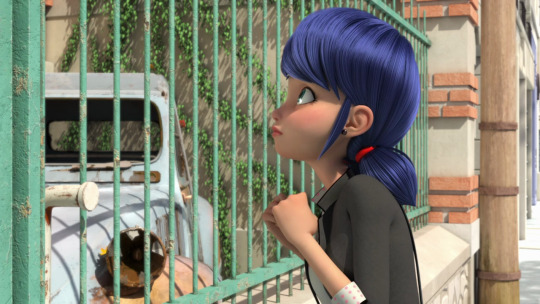
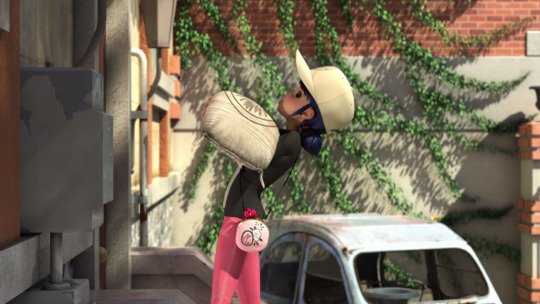
That is a classic Citroën 2CV! One of the most classic cars in all of France!
The 2CV is more or less the French equivalent of the VW Beetle. This car, designed before the Second World War and put into production shortly after it ended, was meant to be a cheap reliable workhorse in particular for French farmers. Its design was in a lot of ways more clever than the Beetle, and it ended up being produced until 1990, in the end becoming sort of a lifestyle vehicle. It is pronounced as "Deux Chevaux" (two horses), which refers to the French tax classification system of its time. With originally 9 horsepower, later upgraded all the way to 29, it was never a fast car, but it had a lot of fans. German speakers know it as "Ente" (duck), which was eventually also used by Citroën marketing, but it doesn't seem to have been an international nickname.
Roland Dupain must have bought this one a long time ago, even though it's only rust now. He actually has a picture of it in his home!
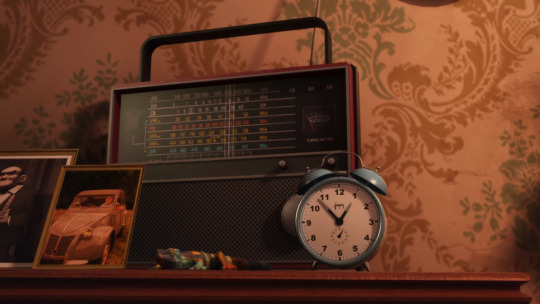
I like that detail. (By the way, it's absolutely insane how much better the animation got between season 1 and season 3. Not always, not consistently, but Bakerix is a great example that has some truly beautiful images in it.)
The other note I found is that in Bakerix, they visit the Gare du Nord, and the London-bound platforms are actually closed off with barriers.
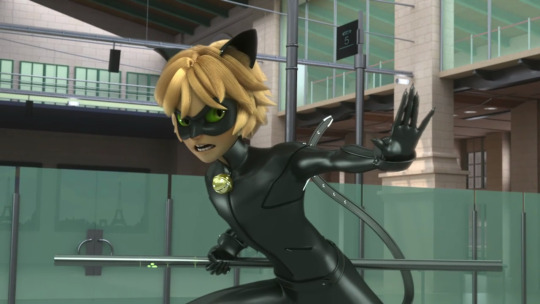


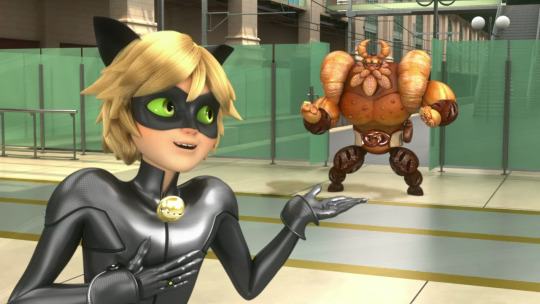
The real-life context is that from Paris's Gare du Nord railway station, you have trains to parts of France, Belgium, the Netherlands, Germany and also the UK. Because the British are… like that, you cannot just board a train to the UK. You first need to go through passport controls, and then you get let onto special platforms where only UK-bound passengers are allowed. It's annoying and silly, but it doesn't seem like it'll change anytime soon. In some episodes of the show, they omit these glass barriers, they're notably crucial for some of Marinette's last-minute train decisions, but in Bakerix, they exist.
This post has no particular point, I just found these things interesting.
56 notes
·
View notes
Text
The King's Men by Nora Sakavic reread
Did Aaron and Nicky really see Andrew without drugs? I mean Aaron must have but, oh oops I'm messing up the time drugs was post mom death not post juvie nvm
I know we aren't supposed to like the "therapeutic reenactments" but like am I reading it wrong or was Andrew raped again (and again and agin) in Easthaven...
"You were supposed to be a side effect of the drugs." (Page 24)
Andrew was basically like "take you shirt off" when striking a deal with Neil (Page 58)
Snort. I hope Roland says concerned about very obvious handcuff marks "from a fight" and a guy who seems really clueless about what handcuff could be used for (Page 64)
🤣 the fact that the "doesn't mean it wouldn't blow you" line was said right in front of Kevin (just in German so he would understand) (Page 65)
The fact that Aaron and Andrew "can't stand the sight of eachother " but they are identical twins says a lot about how they feel about themselves....
I know Andrew doesn't interfere with Kevin and Neil fighting because he has a crush on Neil but it's also a little funny yo assume that his pets can fight eachother butoneone can fight them (NOT like siblings, but also like siblings: I can make fun of my brother but a random does it and it's fight time)
I never quite got why Neil thought the happy birthday message was from Riko, even my first read I figured it was his dad/ his ppl
Look I love angst so Neil grieving his own death (not a identity but truly himself) is 😘
Can we talk about Andrew for a moment: he told Neil (basically) I have a crush on you and Neil went....OH ok... and then did nothing different with that info. I can imagine that is reinforcing Andrew's low self esteem? (Idk) but also like kinda nice, like whether or not they will say the word friends they are and Andrew's crush didn't change that
"I won't be like them. I won't let you let me be." (Page 178) them. Not him. --(Page 369) oh. I forgot about that --- (Page 381)
Ah Neil. I do enjoy your work around there from am nothing" to "you've always said, you want mothing." (Page 224) very good
"You're a different kind of suicidal-... -You're the martyr no one asked for or wanted." (Page 233)
I remember being confused and concerned my first read when Neil was kidnapped only 1/2 way through the boom (my kindle says 58%) - I mean I'm glad cuz then you actually get to see the fallout but I remember worrying how long was Neil going to be there? (I also remember being like oh fuck. He's really gonna die isn't he)
....I don't have any specific reading disabilities but any character with the same starting letter I sometimes confuse. Aaron and Andrew get mixed up sometimes but at least the shape of their names is different enough that it doesn't happen often. Nathan and Nathaniel tho.... ya I'm reading every sentence twice to make sure I'm reading the right name....
I do enjoy when we don't wait for the villain speech and just interpret them with violence (Page 266)
I imagine Nathaniel's manic laughing at the end looked and sounded a lot like medicated Andrew... (Page 268)
Idk why but the scene around Andrew prepping Neil for the shower always confuses me. Not in a "oooh what" but just in a "having a problem following the plot" way... (Page 307)
Andrew "I'm not taking in any more refugees." (Page 341) LOL actually doesn't he? (I haven't actually read most of the extra content but he takes in Robin, right?) Also could u imagine Andrew taking in all of Riko's "perfect court" It would be madness (Also kinda funny cuz Neil would flip between "mom" and "sibling" to Jean and Kevin depending on the situation)
I like the idea that post Nathaniel Neil is more like Andrew than anyone expected. Like, he's got more of a dead neutral face and doesn't pull punches when talking (or hide the violent thoughts he has)
"Die free or die a failure." (Page 343)
I don't remember where I read it (maybe it was one of the extra bits or something?) But it said that Andrew hates women and I just don't think that's right. I think he generally hates everyone and doesn't trust anyone easily but I don't think that's gendered in anyway (his history would more likely say he hates men, I think, but I don't think he thinks of it that way)
So ages are: Jean (who is a current junior), Kevin and Riko ( who are sophomores? Maybe they are also juniors?) Then Neil (who is a freshman)
"And my father comes to all of my games." (Page 410)
So. I don't read mafia books so Riko's death absolutely shocked me my first read (Also Neil's reaction to it) (Page 428)
On to The Sunshine Court. I actually haven't read this one before, some because I needed a break for the mafia vibes, some because I didn't realize that it was Jean's story and not Neil's (which is fine but when ur not expecting it...), and some because I read the first chapter and found Jean very annoying..... but based on some fanart I've seen maybe he will be less annoying and be more sad hurt boi (look internal angst is my jam)
#aftg#all for the game#the foxhole court#reread#kevin day#andreil#andrew minyard#neil josten#the kings men#nora sakavic
27 notes
·
View notes
Text
Out of the OL bubble
Sidenote: this post owes everything to the incredible sleuthing skills of an already longtime trusted friend, who wishes to remain discreet. All credit goes entirely to her - this is such an idiotic topic, yet the Ur Troll insists.
I answered one of you in the comment threads yesterday, that once you get the hell out of the OL bubble, things begin to make sense. Why? Well, because of distance and context, I suppose. And also because this always was the dirty little secret of our Dedicated Manipulative Trolls: to make you believe in a terribly poor narrative, fit for a linear world. A world without compromise, drama, secrets and lies. Collective lack of time, perspective and/or Internet research skills did the rest and gave birth to this monster: the OL Fandom.
We are now told and are supposed to believe that because Scottish Xena apparently chose on purpose (with this and only this, I could agree, but for opposite reasons) to show us she trains in a Cumbernauld gym, that means... well, you know the rest and it involves The Magic Golden Dirk. That troll was never exactly subtle, was she, bless her heart?
That mother and entrepreneur has a life of her own and an entourage of her own and business collaborations of her own and her own agenda. Some of it is shown on her Instagram account, most of it can be speculated. Connecting dots just for the sake of it is neither productive, nor remotely interesting.
Let's see, for example, how she reacts to a very insistent fellow German athlete, whom she is going to meet at the Hyrox Cologne event (13-14th of April, during the Landcon week-end):


😬😱
What is Flamingos Club? Nope, not an ikebana society, no:

Tee-hee.
They were there before, in good company, last year, when they actually first met (rings a bell?):

(April 2023, ok? I am still waiting for my own DeLorean)
Who is this guy?

Fellow athlete, HYROX Ambassador (something I bet the farm she wants to achieve) and a contestant in this year's German reality show First Dates Hotel, on VOX (https://www.vox.de/cms/sendungen/first-dates-hotel.html):
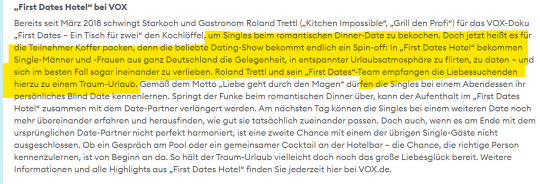
The concept is simple: a renowned German chef, Roland Trettl (no idea!) now takes his blind date cooking show to the next level, with singles from all over the country parked into a Spanish dream holiday resort (Mallorca), shake, stir and see whatever happens. The classical Endemol recipe, now produced by Twenty Twenty. It also has an UK version, running on Channel 4 (coincidence? I doubt that very much, thank you!).
On set, Max's 'love interest' is a certain Linda. He recently wrote her ' a sweet love letter', taking the good advice of his namesake cast friend Max-the-Bartender:

(I swear to God, I feel like I am prostituting my 🧠, right now).
There is obviously nothing to see, here (or is it, such as two wannabes desperately wanting limelight?). She leads the typical no strings attached life of a single mom and he is still looking for a real job:

Since VOX does not give his full name, neither will I. It took five minutes to find him, with a bit of luck.
Why on Earth would one connect that woman to S, rather than to this nice, ambitious Bavarian?
I know why. It's almost too damn easy.
Two words: Channel 4. Truman Show. Ginger and Fred (oops, these are Our Couple).
Is it anything we haven't seen before?
Nope. We've seen way worse. But gone are the Days of Flukenzie Floozy.
[Edited] - there is no need to further expose our people.
73 notes
·
View notes
Text
Wind Breaker Episode 11 Review - New Day, New Classmates
I’m a little confused. Tsugeura’s little motto revolves around the word “virtue”. In the manga, it’s virtue. The subtitles call it virtue as well, but I’ve seen some subs use “aesthetics.” What is the accurate word? A moot on Twitter says that the accurate word should be “aesthetics”. Virtue means a behavior showing high moral standards while aesthetics means a particular theory or connection to beauty or art. My moot told me that the word Tsugeura uses is actually more associated with aesthetic rather than virtue. I don’t know…. For now, I’ll just call it virtue since that’s what the subtitles say, but if they switch it to aesthetics or something, I’ll use that.

Anyways, it’s a new day, the fourth to be exact, and Sakura meets two new classmates. The first is Taiga Tsugeura who likes to talk about virtue, is a gym bro, and is an all around himbo. He speaks in Kansai dialect, by the way. While he’s a nice guy, he lacks personal boundaries, which is why everyone avoids him. Sugishita’s face says it all. Fortunately, Sakura, Suo and Nirei are nice enough to hang out with him after school. Tsugeura is a macho guy, but he’s surprisingly goofy and sensitive. While he doesn’t get along with Kiryu, he doesn’t let that bother him. He’s very funny, honestly. I think he brings a good dynamic to the group as the optimist in a way. His fighting style centers around wrestling with the way he did a German suplex to one of those scrubs.
Tsugeura’s voice actor actually surprised me. He’s voiced by Kengo Kawanishi. You might know him as Muichiro from Demon Slayer and Roland Fortis from The Case Study of Vanitas. Why I was surprised was because I normally associated with him quiet pretty boys, but remembering that he voiced Roland, he has the capability to go loud and dumb too. Also, another thing that surprised me about him was that Kawanishi always sounded like he could be Akira Ishida’s successor in terms of range and tone, but the voice he uses for Tsugeura makes him sound like Noriaki Sugiyama who you might know as the voice of Sasuke Uchiha from Naruto and also voiced Muichiro’s dad who appeared in the third season of Demon Slayer. Kawanishi’s range is seriously killer.
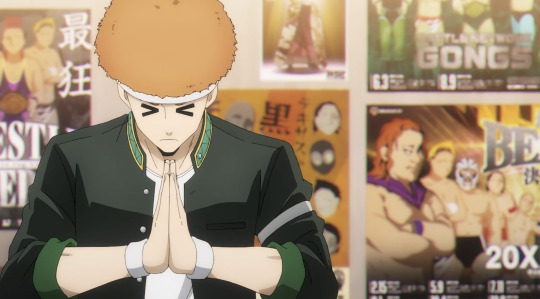
The second of the new classmates is Mitsuki Kiryu. He’s rumored to be from a rich family with the way he went to a rich kid’s school during junior high. His past sounds very interesting if he chose to rebel and went to Fuurin; I’m super curious as much as I am curious about Suo’s past. Kiryu is practically the total opposite of Tsugeura in every way. He respects people’s boundaries, especially girls’, but is rather effeminate compared to the macho himbo Tsuge-chan. He’s also a huge phone addict as he was first seen in episode 2 playing with his phone. I do wonder if he has a hamburger case alongside the hotdog case. His fighting style sort of reminds me of the Gentle Fist style from Naruto, especially with the way it focuses on deflecting as Kiryu deflects his opponents and sends them flying to his allies.
Kiryu’s voice actor is Toshiyuki Toyonaga. It’s been a while since I last heard Toyonaga voice a rather effeminate character. I actually really like his acting a lot! He has so much range that his voice is so hard to detect because he sounds so different in whatever anime he’s in. If you’re curious on what roles he had done in the past, some examples include Yuuri Katsuki from Yuri on Ice, Kazuki Kurusu from Buddy Daddies and Nayuta Yatonokami from Paradox Live. All three of those roles sound different, yet they come from the same person. Amazing, isn't it? I love how Toyonaga gives Kiryu a boyish voice; that tone is so cute.

The fighting scene in the anime was well-animated! All three have such distinct styles, but it meshes so well together. Heck, even Suo gets to be a part of the fight, despite him being at the back protecting Nirei and the girl Kiryu saved and only fighting when mooks try to run towards the back. I really like the part where Sakura is flipping around after Tsugeura throws in a punch and then Kiryu deflects a guy towards him.
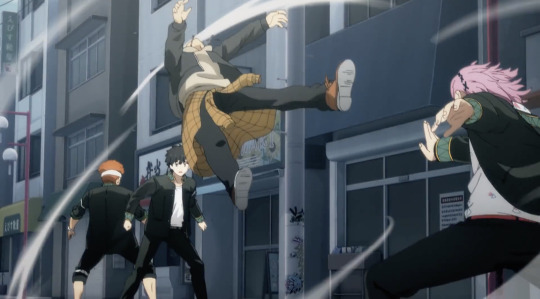
The episode is also has some development towards Sakura as he gets new fighting allies in Tsugeura and Kiryu and even gets five new contacts in his phone. He’s the most chronically offline teenager, and he’s even slowly adjusting to the teen life by attempting to participate in group chats and stuff. I hope that Sakura becomes an expert at instant messaging by the time the story ends.
The episode ends with the second years coming to Sakura’s class in order to pick a Group Captain. What is a group captain? It’s like a top of the class or something. Suo volunteers Sakura to be captain. What happens next will be shown next week. However, the second years showing up is great because Enomoto is hilarious with the way he rolls his R’s. Can you believe that he’s voiced by Taishi Murata, who voices Pieyon from Oshi no Ko? Crazy, right? That’s the third voice actor with crazy range in this episode. Also, this is the introduction to Kaji but I’ll talk more about him next week as he’ll finally talk. I can’t wait to see people’s reaction to Kaji. He’s such a great character.
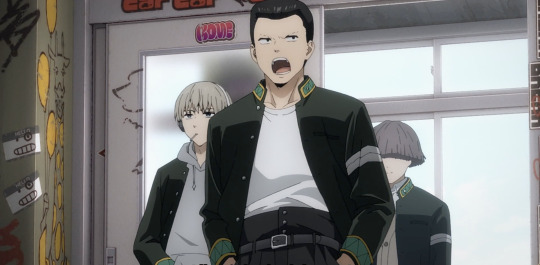
There are two more episodes left. With how popular this show is in the Japanese fanbase, I wouldn’t be surprised if a second season will be announced; I certainly want it. What are your thoughts on this episode and are you also wanting a season two like I am?
#wind breaker#windbreaker#Haruka sakura#Akihiko nirei#Hayato suo#taiga tsugeura#Mitsuki kiryu#takeshi enomoto#Ren Kaji#Yuto Kusumi#review#anime#anime review#ecargmura#arum journal
36 notes
·
View notes
Text
Introducing:
Vivian Choquette

A new OC for the upcoming fic Your Love's Been a Long Time Coming.
Headcannons:
- Born in 1940, she's 19 when she meets Elvis
- Her mother, Delphine, was French and she never knew her father. Her mother was a dancer and she married Vivian's stepfather, Roland Everett, an American officer, during WWII in 1945. Delphine passed away when Vivian was 14. Now, she lives with her stepfather where he's stationed in Germany.
- She speaks English and French fluently and knows how to communicate in German fairly well.
- She smokes, drinks, and cusses like a sailor, but there's an elegance and grace to her that seems to make everyone forget how crude she can be.
- She writes poetry in English and French and is obsessed with reading, specifically literary criticism, philosophy, poetry, and classic literature.
- She's also an actress, a singer, and plays the piano.
- Her aesthetic is romantic academia and her favorite colors are light pink and mint green.
- Her birthday is February 26th, making her a Pisces.
- She's an outgoing introvert, meaning she loves to work the room at a party, but she also needs time alone to recover from the interaction.
- Her first love was a boy in high school who wrote poetry and played the violin. He promised to marry her, took her virginity, and then disappeared.
- She's a hopeless romantic who is obsessed with all things related to love and the beauty of human connection. She thinks people are poetry and nature is spiritual.
- Her hair is dark brown, her eyes are deep blue, and she's 5'2" tall. Her build is petite and slender and her hands and feet are small and almost fairy-like.
- Despite her French blood, she prefers American food. Still, she herself cannot cook to save her life. She's been known to burn toast and struggle with boiling eggs.
- The other thing she cannot do is any kind of visual art. She can't paint, draw, or sculpt and finds it infinitely frustrating.
- She has a quick, short temper and will explode easily and then forget why she was mad ten minutes later. She also has a sense of melancholy about her and when she's in a mood can spend hours weeping over a sad song or poem.
- She loves music, but her exposure is fairly limited to classical and pop. Her favorite music is her mother's collection of Claude Debussy, specifically Clair de Lune and La Cathédrale Engloutie.
- All in all, she's like a summer thunderstorm, beautiful, chaotic, calming, and poetic all wrapped into one.
******
Stay tuned to meet her as Elvis does
*~*~*~*~*~*~*~*~*~*~*~*~*~*~*~*~*~*~*~*~*~*~*
Taglist:
@ccab @aliypop @your-nanas-house @rjmartin11 @elvisfatass @tacozebra051
Let me know if you want to be tagged in her fic!
#elvis presley fanfiction#elvis fanfic#elvis presley fic#original character#elvis presley x oc#elvis x oc#oc#ocs#elvis fanfiction#Vivian Choquette#your loves been a long time coming#ylbaltc
39 notes
·
View notes
Text
30dtsc day 1: Favorite Episode
→ Herz der Schlange
Es ist nicht weit hergeholt zu denken, dass das Herz der Schlange meine Lieblings-Spatort-Folge ist. Stellt sich nur die Frage nach dem warum. Warum ausgerechnet Herz der Schlange?
Die Antwort ist recht simpel. Der Fokus liegt genau so auf den Ermittler*innen wie er auf den Mordopfern und der Lösung des Falls liegt. An gewissen Stellen kann man schon fast vergessen das es garnicht darum geht den Mord an Roland Schürk zu lösen um Adam aus der Haft zu holen, ähnlich wie Leo das auch regelmäßig über die 90 Minuten hinweg tut. Ich muss selber zugeben das ich nach dem ersten Mal schauen garnicht mehr so genau wusste was der andere Fall eigentlich war.
Es ist auch irgendwie die Folge die es mir ermöglicht hat mehrere Personen in den Spatort-Wahn zu ziehen, zuletzt noch meine Schwester über die Weihnachtstage. Zuerst ist leichtes Interesse da, aber eher weil es halt ein Krimi ist und man dann doch wissen will wer denn jetzt diesen gerade erst vorgestellten Nebencharakter umgebracht hat. Dann kommt man zu Herz der Schlange. Es fängt an wie jeder andere Krimi im deutschen Fernsehen auch, mit einem Mord. Doch dann ist da ein zweiter Mord und es war augenscheinlich einer der Ermittler. Vielleicht auch noch nicht ganz originell. Aber wenn dann der Ermittlerkollege alles stehen und liegen lässt um den anderen rauszuholen und dabei seine eigentlich Arbeit aus den Augen verliert. Dann ist irgendwie doch jeder hooked dem ich versucht habe den Spatort näher zu bringen.
Das Storytelling in HdS finde ich auch einfach sehr schön. Das wir Adams Seite des Abends erst nach und nach erhalten, zuerst selbst nicht wissen ob Adam denn jetzt seinen Vater umgebracht hat oder nicht. Und das wir dann dabei zusehen können wie Leo selbst alles zusammensetzt, kurz nachdem wir das Wissen aus einem Flashback erhalten haben. Und ganz ehrlich, es ist schon ziemlich gut wie die der Hauptfall und der Tod von Roland Scherk am Ende doch irgendwie mit einander verwoben sind.
Ich muss ehrlich sagen, rückblickend ist Herz der Schlange auch die Folge über die ich am meisten nachgedacht habe. Man siehe nur diese eine Fanfic die ich in einem Wahn geschrieben hab als sich plötzlich eine etwas makabre Idee in meine Kopf festgesetzt hat und dann ein What if entstanden ist in dem Adam das Froschgift nicht überlebt hat. Eigentlich bringe ich meine liebsten Charaktere nicht so gerne um, aber hier hat mir das Source Material einfach eine zu gute Vorlage geliefert.
Das sind wohl schon genug Gründe warum Herz der Schlange meine Lieblingsfolge ist obwohl ich noch Stunden so weitermachen könnte.
English version under the cut :)
It’s not that far off to think that Herz der Schlange is my favorite Spatort-Episode. It just leaves the question of why. Why Herz der Schlange of all things?
The answer is pretty simple. The focus lies just as much on the investigators as it is on the victim and solving the crime. It is possible to even forget that the main directive isn’t solving the murder of Roland Schürk to get Adam out of jail at certain points, just like Leo forgets about the main case many times over the 90 minutes of runtime. I have to admit myself that I wasn’t sure what the actual main case was after watching it for the first time.
It is also the episode that made it possible for me to pull multiple people into the insanity of Spatort, the last one being my sister who I got over the Christmas Holidays. At first there is general interest because it’s a crime show and those are often responsible for us wanting to know who killed the side character that was just introduced. And then there’s Herz der Schlange. It starts like any other crime show in German TV, with a murder. But then there’s also a second murder and the murderer is most likely one of the main investigators of the show. Maybe to the most original idea but it gets so much better when the other investigator stops everything and sets heaven and hell in motion to get his colleague out of jail while loosing sight of the actual case he’s supposed to solve. At that point everyone who I tried to get into Spatort was hooked.
I also just like the storytelling of HdS. That we get Adam’s side of the evening bit after bit and that we just don’t know if Adam actually killed his father or not. And that we get to watch as Leo puts the pieces together just after we got the answer in a flashback. And let's be honest, it’s pretty great how the main case and the death of Roland Schürk do turn out to be connected in some way.
In all honesty, looking back Herz der Schlange is the episode I thought about most. Just look at the fanfic I wrote in a haze because the slightly macabre idea just came to me all of a sudden and didn’t leave again causing a what if story in which Adam didn’t survive the frog’s poison. Normally I don’t enjoy killing my favorite characters that much, but this time the source material gave me a too good premise to work with.
I think that are quite enough reasons why Herz der Schlange is my favorite episode, despite the possibility that I could just continue for hours.
19 notes
·
View notes
Note
Ah. Big Chuck is basically the father of Europe, he was mostly known as a politician and king but there are stories about his adventures as a swordsman in his youth. He was the King of a very large part of central Europe known as the Holy Roman Empire. Which was neither Holy, Roman nor an empire. But from what I remember of stories he was known to be a very competent statesman who managed a large amount of vassals. He also made educational reforms and united and converted the German people... I think. So basically he's a giant brain while the Paladins would be the more mythic figures meant to go on adventures for ancient relics and be exemplars of knighthood. Asfolto also flew to the moon once if I recall? Roland was known as having a diamond body I believe, which likely is enhanced by the T-summon if it is indeed Mandricardo who had the armor of Hektor.
...Basically a Knight. That strips. A really tough Knight.

MUSASHI: "Huh. Well, the stripping part was pretty apparent, but the rest is good to know."

NERO: "On the topic of Roland, segueing back into the Flaming Bout… I've made some adjustments to Saber's mystic code, as agreed."

MUSASHI: "Oh, right! Caster basically made me into a certified water spirit… or what's the word you used? Right, sea-nymph! I never thought I'd say this, but I feel kind of pretty wearing it. No, sexy! No, wait--"

GIUSEPPE: "Let's remember propriety before you throw out a word more intense than 'sexy', please?"

MUSASHI: "Hehehe~ it's pretty good~!"

NERO: "Hahaha! I'm glad you like it! I knew you'd appreciate my genius!"
Based off NERO's skills, it seemed like the stuff she could make was pretty weird. But… well, this seemed like it turned out fine. Probably.
MUSASHI's Servant Matrix has been updated!
13 notes
·
View notes
Text
Paul's Balls-in-the-Zipper Voice (Special)
Donington, Monsters of Rock 1988
Kiss' or rather Paul's performance of Strutter at the Monsters of Rock Festival in Donington in 1988 is regularly spit out in popular polls on fan forums, especially when it comes to determining one's vocal best performance as precisely as possible based on a certain representation of a certain era of the band.
And that's pretty hard stuff, as I would like to point out, because I personally always find such a result a little thought-provoking, as my Paul's Balls-in-the-Zipper column owes its name to precisely this appearance.
I can't remember exactly when I first consciously saw and heard this one version of Strutter in today's context, maybe five or six years ago on Youtube, who can say for sure in this age of the internet. I can only remember being pretty sure that I clicked on a video with the title "Kiss Strutter Live Donington 1988" or something similarly unambiguous (1).
I can also remember just as clearly how the further the video progressed, the more unsure I became as to whether it was actually Kiss I was watching, and not in fact a mis-tagged band like Poison or some other shrill-squealing contemporary hair metal band. You have to understand, the picture quality really wasn't the best (2), but my ears still worked without the slightest problem.
Needless to say these doubts only grew in me after I made sure that I hadn't accidentally switched the video to increased speed replay beforehand.
And only then did I take a closer look at the figures jumping around on the stage. Blurry figures with curly long black hair: Check! A drum kit with a good half meter of swirling curls and a round traffic sign with a Japanese symbol on the bass drum: Check! Gene in all black leather gear trying to hump his staccato McBrown bass in routine leg-spreading rock-it poses: Check! Bruce Kulick confidently and casually immersed in his guitar playing and strolling across the stage with playful ease: Check!
But there was this other figure, dressed in white sporty clothes, armed with one of those not really shapely headless Steinberg guitars of that late 80s period that Paul had been photographed with on one occasion or another (3). And I admit, it could well have been Paul, but, it sounded nothing like him.
Maybe it was just the sound engineers having a nasty little joke that everyone but me had missed, but could that really be the case? And so it actually went on for the entire video, until it gradually but inevitably dawned on me: Yep, that's actually Paul, and not Vince Neil after some hardcore vocal training, or a similar figure in a black wig.
Well, and now you know the whole story.
And should this not be the truth in all truthfulness, and I shout this to the heavens with a raised fist, may I jam my balls in my zipper every day for the rest of my life when I get dressed, or undressed!
As my name is Roland Rockover!
Side Note:
(1) The complete concert of their Monsters of Rock performance in Schweinfurth '88, however, was shown on German cable television a few days before Christmas. My mother spontaneously and secretly recorded it on video and surprised me with it, unsuspectingly, the day before Christmas Eve. God bless her immortal soul.
(2) I think I even managed to find this YouTube video again. It's a good five years old, so that should work.
(3) I think Paul had mentioned at some point that he had played these things for hip health reasons, as they were considerably lighter than the classic models he was used to.
Strutter (Live at Donington, 1988)
youtube
#Kiss#Paul Stanley#Gene Simmons#Strutter#Paul's Balls-in-the-Zipper Voice#Monsters of Rock#1988#Donington#Schweinfurth#Poison#Vince Neil#Staccato McBrown#Steinberg#Headless#Christmas#Roland Rockover#Cable TV#Eric Carr#Bruce Kulick#Youtube#Band
6 notes
·
View notes
Text
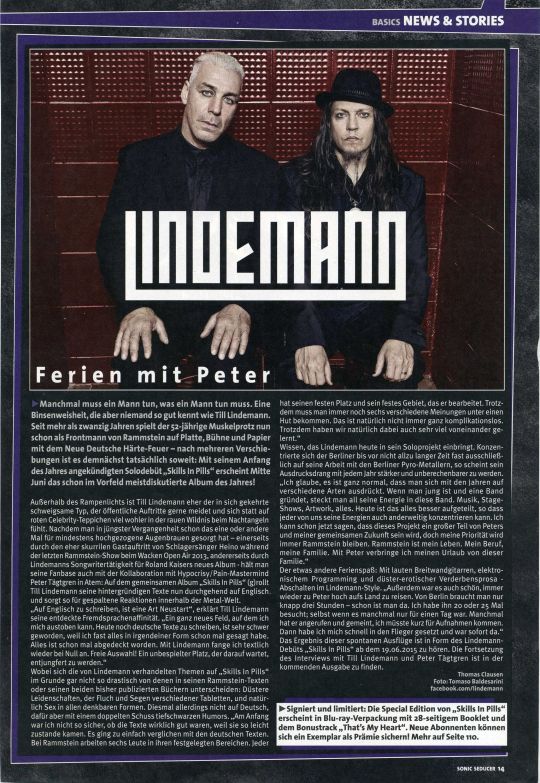
Sonic Seducer - 2015, Interview with Till
"Rammstein is my life. My job, my family."
Sometimes a man's gotta do what a man's gotta do. A truism that no one knows as well as Till Lindemann. For more than twenty years, the 52-year-old muscle man has been playing as Rammstein's frontman on records, stage and paper with the Neue Deutsche Härte-Feuer - after several postponements, the time has finally come: with his solo debut 'Skills In Pill’s announced at the beginning of the year will be released in mid-June, the most discussed album of the year!
Outside of the limelight, Till Lindemann tends to be the introverted, taciturn type who likes to avoid public appearances and feels much more comfortable in the rough wilderness night fishing than on red celebrity carpets. After one or the other time in the recent past at least raised eyebrows - on the one hand through the rather bizarre guest appearance of pop singer Heino during the last Rammstein show at Wacken Open Air 2013, on the other hand through Lindemann's songwriting work for Roland Kaiser's new album, also keep your fan base in suspense with the collaboration with Hypocrisy/Pain mastermind Peter Tägtgren: On the joint album 'Skills In Pills' Till Lindemann rolls his enigmatic lyrics in English throughout and thus causes divided reactions within the metal World.
«Writing in English is a kind of a new start,» says Till Lindemann, explaining his discovered affinity for foreign languages. « A whole new field in which I can let off steam. It has become very difficult to write German texts today because I have already said almost everything in some form. Everything has already been covered. With Lindemann I'm starting from scratch lyrically. Free choice! An unplayed place waiting to be deflowered. »
The themes dealt with by Lindemann on 'Skills In Pills' don't really differ that drastically from those in his Rammstein texts or his two previously published books: Dark passions, the curse and blessing of various pills, and of course sex in all conceivable ways or form. This time, however, not in German, but with a double dose of deep black humor. « At first I wasn't so sure if the lyrics were really good because they came together so easily. It was too easy compared to the German texts. At Rammstein, six people work in their designated areas. Everyone has their place and their fixed area that they work on. However, you still have to reconcile six different opinions. Of course, this is not always entirely without complications. Nevertheless, we of course also learned a lot from each other. »
Knowledge that Lindemann brings to his solo project today. Until recently, the Berliner focused almost exclusively on his work with the Berlin pyro-metallers, but his urge to express himself seems to become stronger and more unpredictable with each passing year.
« I think it's normal to express yourself in different ways over the years. When you're young and you start a band, you put all your energy into that band. Music, stage shows, artwork, everything. Today everything is better divided so that each of us can concentrate our energies elsewhere. I can already say that this project will be a big part of Peter's and my future together, but my priority will always remain Rammstein. Rammstein is my life. My job, my family. I spend my vacation from this family with Peter. »
Holiday fun with a difference: With loud widescreen guitars, electronic programming and dark, erotic doom prose - switching off in Lindemann style. « It was also nice to travel up to the countryside to see Peter again and again. It only takes about three hours from Berlin and you're there. I visited him 20 or 25 times; even if sometimes it was just for a day. Sometimes he called and said I needed to come in for a quick recording. Then I quickly got on the plane and was there straight away. »
The result of these spontaneous excursions can be heard in the form of the Lindemann debut 'Skills In Pills' from June 19th, 2015. The continuation of the interview with Till Lindemann and Peter Tägtgren can be found in the next issue.
#till lindemann#lindemann#rammstein#2015#interview#translation#*scans#*#thanks to ramjohn for the scans!
47 notes
·
View notes
Text
We Who Are About To Die episode 1
This got bad reviews, but what sword and sandals media gets good reviews? That said:
-Bewilderingly, the show has several Numidians and plays them as the most cliched African tribesmen imaginable, instead of as Berbers. I can only imagine that Peacock got more ESG points for black people than for Arabs. Either that or they saw that the source material had a "slaves trying to break free" plot and just had to make those characters black.
-It also plays them as Noble Savages entirely straight, being just aghast at how humans can kill for reasons other than eating. Okay, Tarzan, whatever you say.
-Naturally, the one gay character is the most debauched, out-and-out villain. Roland Emmerich is gay, so I think this is just his throwback to Spartacus and the like, but who would've thought a German would have that much of a sense of humor?
-In case you're wondering how dumbed down this all is from actual Roman history, they say at one point "All the people care about are bread and games." Because circus = spectacle = games is too big a leap for their target audience to make, one guesses.
-At one point, the chariot race announcer declares "Ride or die!"

-Anthony Hopkins gets the thankless role of old guy emperor. Would it be too much to ask that they get Pacino or Deniro for one of these? I feel Hopkins has done this character a dozen times.
-Speaking of, I know the British accent isn't realistically what ancient Romans would sound like, even if they were speaking English--but is it too much to ask for some consistency? It's just weird to hear the Romans go from British accents to American accents at random.
-The main 'Numidian' chick, Cala, has entirely too much plot armor. She's played something like a reverse Paul Atriedes who is induced into Roman society and immediately comes up with all these one-neat-tricks to improve things, as well as instantly becoming the right-hand man to antihero Tenax. It was unbelievable to me that Tenax has so small an organization that Cala is the first person to come along that he can delegate to, but at the same time he's such a huge power broker that he can affect the course of the Empire.
-This show has waaaay too many characters, man. Just for starters, we have three Spanish horse guys, four Numidians, two rival charioteers, the Roman emperor and his competitive sons, assorted gladiators, assorted politicians, random Romans who hold stock in the arena, and all their kooky love stories... it got to the point that two female characters started having a love scene: I had no idea who one of them was and whether the two had ever had scenes together before. And it's not like all of these characters come together at the end. Plenty of them are just THERE and never contribute to the larger plot. I understand not thinking this would get a second season, but surely they could've saved a few of these people for later instead of cramming them all in at once.
-A surprising amount of plot points arise from the charioteers 'boxing each other in' against a wall so that they can't get out of the way of an obstacle and crash right into it. I don't know, I'm not an expert chariot racer, but... horses stop, don't they? It's not just turning them left or right, you can actually make them stop, correct?
5 notes
·
View notes
Text
Quedlinburg (& Wernigerode)
Well then. Quedlinburg and Wernigerode are both small cities with a pretty old citycore in the Harz region in Germany, and were part of a bunch of wealthy cities in that area in the middleages. Other nearby cities are Blankenburg and Halberstadt (the latter I visited last year I think... or the year before). The Harz itself is a mountain range in the middle of Germany, and is most famous for the Brocken where it is said that the witches go there to dance with the devil. You can go up there and have a lovely view over mostly flat landscape, but I have a fear of heights and also don't like the cold very much, so no Brocken visit for me. Quedlinburg is the city where Heinrich (or Henry) I of Saxony was declared king in 919, ...or at least it is said that he got informed about that in Quedlinburg. Maybe. No one knows really. Anyway, he seemed to have liked the city quite a lot and even wanted to get buried there. His other (maybe even greater) hobby was... birds. And catching them. Which led to him carrying the name Heinrich der Vogler (Henry the birdcatchingman basically, as seen clearly in the picture below).

Nevertheless he was the Founder of the later very important Ottonen kings and Kaisers (who were mostly named.. Otto -> Otto I, Otto II, Otto III). And since European kings were traveling a lot to keep their land and people in check, they needed castles to rest inbetween. Which led to the fortification and building of several castles fit for a royal shortterm stay, in German called Königs- or Kaiserpfalz. One of those is the castle on the steep hill in Wernigerode, another is in Blankenburg.



But back to Quedlinburg. Quedlinburg has no real castle. At least not in the sense of a Pfalz. Instead it has the "Collegiate Church" St. Servatii. Built on a hill it was originally planned by Heinrichs wife to be the final resting place for herself and Heinrich. Which did not work out. He was later relocated and got lost and no one knows where his corpse ended up. Anyway, to keep the memory of this birdfriendly man St. Servatii was led by women who did just that - pray for his soul and keep the important things Heinrich and his progeny did in a huge book. All these women came from royal families and had very good relationships to all sorts of wealthy people and had the upper hand when it came to the city management of Quedlinburg. Not that the wealthy people in Quedlinburg really liked that. During Hedwig of Saxony's "reign" (1458-1511) Quedlinburg wanted to become independent since trade became more important than the church (remember: Reformationtime had already started). So Hedwig called her big brothers, the knights and kings and whatnot of Saxony, and made them fight against the townfolks. As a powerful symbol they destroyed the Roland statue at the market, which was a sure sign of city independence and tradevalue, and also showed an alignment with the northgerman Hanse (nearly all big and small cities have a Roland somewhere). But well, that didn't last very long. The Roland came back a few years later.

Today St. Servatii is a romanic church with a crypta (one of the very few things still existing in an early medieval frankish-style), joined by a huge castle-like building that changed many times over the years, and several gardens. It is also surrounded by a huge wall.



I somehow didn't take a single photo of the church+buildings from the outside. Sorry. But the city itself is more pretty anyway. Get some inspiration from the following pictures!




Over 60% of all Fachwerk-houses were renovated during the last 30 years, and made fit for modern living. Really, each time I woke up and looked outside I thought I woke up in 1400 something. The bells of the churches signaled when to open or close businesses and after dark the streets were even more empty than during the day (which is a very different experience in summer, trust me). But holy hell, you better not break your leg while you live there. The stairs are... a thing. It's all very crooked and narrow.

We were very lucky to be there for market day both in Quedlinburg and in Wernigerode. They sold a veeeeeeeeeeeeeeery tasty salami made from stag, and we tried a horsemeatball (tasty!). And don't get me started on all the little shops you can browse through. Some are just rubbish, but they have a very good teashop and we spend nearly 75€ on stuff in another shop that sold all kinds of chocolate, sweets, writing material and pretty things. We also had one dinner in the Ratskeller (the cellar below the townhall where the best wine and goods were stored), it was delicious. As were all the cakes in the shops!
All in all: I loved it. It was incredibly cold, but sunny. And with less people about it was an absolute joy to walk through both cities. Lastly, a picture of the townhall in Wernigerode (with old people, ...sorry old people but if you constantly run into my pictures I can't do anything about that).

4 notes
·
View notes
Text
🛫 Distance - Chapter 1 🛬
Here we gooooo! After only three(!) attempts at the plot, I finally put all the pieces together for it to work. The first two chapters are already published in German here, but I'm trying to get chapter 2 translated as quickly as possible into English as well. (I decided to only publish in English on AO3, as to not clutter my works so much with everything in two languages 😅)
If you haven't read Common Ground, I would recommend to read that first, since this is the sequel ;)
So, without further ado, I wish you lots of fun with the starting chapter of
Distance
"Can we have a little snippet?" you ask? Of course you can! Here you go!
“Pegasus called me tonight.” For a second, Seto's heart seemed to skip a beat and then immediately try to make up for it all the faster and harder. He knew what was coming. “To congratulate me, of course, but he ... also made me an offer.” I'm thinking of luring young Devlin back to America. Maybe just for a few months at first, as part of a generously paid internship, but of course in the hope that he'll get a taste for it and decide to stay permanently. Like a sword of Damocles, Pegasus' words from that day had hung over their entire time together, which was why Seto had been meticulous about not letting this whole thing-with-us-business go too deep. Well, at least he had tried.
Chapters: 1/? Wordcount: 6,006 Fandom: Yu-Gi-Oh! Duel Monsters (Anime & Manga) Rating: General Audiences Warnings: No Archive Warnings Apply Relationships: Kaiba Seto/Otogi Ryuuji | Duke Devlin Characters: Kaiba Seto, Otogi Ryuuji | Duke Devlin, Kaiba Mokuba, Pegasus J. Crawford | Maximillion Pegasus, Jounouchi Katsuya | Joey Wheeler, Isono | Roland, Original Characters Additional Tags: Mastershipping - Freeform, Long Shot, POV Third Person, POV Kaiba Seto, POV Duke Devlin, Interns & Internships, Long-Distance Relationship, Los Angeles Series: Part 2 of Common Ground Summary:
Five months after the fateful school trip, Seto and Duke are still seeing each other regularly without the most important people in their lives knowing about it. The thing-with-us is good the way it is – who cares what it actually means? But their time at school is drawing to a close and ultimately, what Seto has secretly feared for a long time happens: Duke is offered a six-month internship at Industrial Illusions, opening him all the doors to a successful career as a game designer – an offer he can't possibly refuse. However, the journey back to the other side of the Pacific is not just an opportunity for Duke. While he has to confront the demons of the past, Seto has to ask himself whether his own future is really as clearly mapped out as he always assumed.
2 notes
·
View notes
Text
Luther Discovers Hus
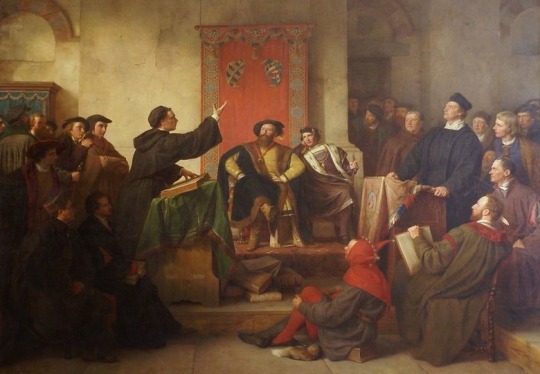
“You are espousing the pestilent errors of Jon Hus, who claimed that Peter neither was nor is the head of the Holy Catholic Church." John Eck accused Luther "I repulse the charge of Bohemianism," roared Luther.
This was an intense moment in the German town of Leipzig in July, 1519. Luther’s old German friend, John Eck, had challenged Luther to a public debate. For eighteen days the debate between Eck, Luther and Andreas Carlstadt was the center of the western world. This debate was a major turning point for Luther and the Reformation.
Eck, a polished debater, tried to corner Luther to admit that he agreed with the condemned Jon Hus. At first Martin told Eck the Bohemian was not an issue for the debate, and that he didn’t agree with Hus. But Luther didn't really know what Hus believed, only that he was a heretic.
During a break for lunch, Luther went to the university library and read the trial notes that condemned Hus as a heretic. Historian Roland Bainton said Luther found “to his amazement,” that he did agree with Hus. Bainton continues, “When the assembly reconvened at two o'clock, Luther declared, ‘Among the articles of Jon Hus, I find many which are plainly Christian and evangelical, which the universal Church cannot condemn.’" At this admission Duke George in disgust muttered in a loud enough voice that all could hear, “The plague!”
Eck had cornered Luther into a surprising concession. Because of that, some say Eck won the debate, although many say it was a draw. The debate ultimately helped Luther, who felt the debate was a waste of time, free himself further from the papal system. And Martin Luther had found a friend and ally in Jon Hus, a man burned at the stake as a heretic one hundred years prior to Luther.
“I thought of John Hus as a cursed heretic,” Luther later said. “I counted it a sin even to think of him. I would gladly have furnished the wood to burn him. I would have felt I had done God a real service….I was struck with amazement as I read on, and was filled with an astonishment difficult to describe, as I sought out for what reason so great a man—a doctor, so worthy of veneration, and so powerful in expounding the Scriptures—had been burned to death.”
If such a man, he wrote, "is to be regarded as a heretic, then no person under the sun can be looked upon as a true Christian." The Leipzig debate sealed Luther’s fate. It was only a matter of time before he would be excommunicated from the Catholic Church.
Martin Luther's "discovery" of Hus tells us a lot about Luther. He reads Hus and immediately changes a long and deeply held belief he had about Hus, showing that Luther is very teachable and willing to admit he is wrong. He casually admits his error to a room full of peers and powerful men. He didn't seem to care or worry about how this admission would effect his reputation--which was an amazing tendency of Luther. This shows Luther’s bravery and willingness to accept the repercussions of his convictions. The Leipzig Debate reveals the character of Luther and why he was the spearhead of the Reformation. It also moved Luther and the Reformation even further from Catholic teachings. "The ship of the Reformation was cut from its moorings, and had to fight with the winds and waves of the open sea," writes Historian Philip Schaff.
Source: https://www.facebook.com/church.history01
This is a really good Facebook account. Check it out and give Church History a follow.
11 notes
·
View notes
Text
Raymond Shields' new name: Eddie Fender
This is the 19th post in the Ace Attorney Investigations Collection Countdown: 62 days left until release!
Today's topic: Eddie Fender aka Raymond Shields!

I'm going to be honest: Ray isn't among my favourite characters. I do like him, especially for the role he plays in Investigations 2's story, but I'm not the biggest fan of his personality. I like his interactions with many characters but I'm not all that attached to him for his own sake so I basically would not have cared whatever his name in the official localisation would've been.
I like "Raymond Shields" as his name with "Shields" fitting to Miles' "Edge" in "Edgeworth" (similar to how their Japanese names have the meanings of "shield" and "sword" respectively) and "Raymond" coming from Proto-Germanic meaning "advice" and "protector" which handily fits his role in the game and his job as a defense attorney in general. Going from "Raymond" to "(Uncle) Ray" as a nickname also works really well.
From what I've seen "Eddie Fender" is only really a play on "a defender" which also references his defense attorney position but doesn't do much else. In that context I definitely prefer his fan translated name, it seems to have more meaning behind it. I don't know if he will also refer to himself as "Uncle Ed" or "Uncle Eddie" in the official localisation but somehow that sounds... dirtier than "Uncle Ray"? I'm not the biggest fan of his hug gimmick anyway (except that one time where Patricia Roland "out-hugged" him 😂) so I hope they won't make it worse. (I assume his "full name" is "Edmund" even though he'll only be called "Eddie" to make the pun work - similar to how Gumshoe's actual first name is likely "Richard" with "Dick" being a nickname but "Dick" has the detective reference so that's what he's called - so we'd have a similar nickname situation to "Raymond" and "Ray".) I don't care about his character enough to be particularly upset about the inferior name - and while it's less good than the fan translated one I don't think it's horrible either - but if I had to pick, I'd definitely go with his fan translated name.
#ace attorney#ace attorney investigations#aai collection#ace attorney investigations collection#ace attorney investigations collection countdown#62 days left
3 notes
·
View notes
Text
Epic Fantasy through the Ages
A Chronology of Story
This is a work in progress, but here is my list as of 6 July 2023. Please feel free to send me additions or corrections. I have focused on epic (works that are long and took a long time to create) and fantasy (works that include an element of magic, the supernatural, or superpowers). Some of the list could be categorized as myth, some as Literature™️, some as science fiction, but beyond these categories are the two main criteria of epic and fantasy. I also don't fully know what all of the ancient to modern works encompass, but that's the fun of read and find out. I probably have added some things that don't properly meet my criteria, and that's fine with me. 🌺
Works by Mesopotamian Bards (3100 BC - 539 BC)
Enumah Elish (Epic of Creation)
Atrahasis (The Flood)
Epic of Gilgamesh
Descent of Ishtar
Epic of Erra
Etana
Adapa
Anzu
Nergel and Ereshkigal
Avesta by Zoroastrian Bards (1500 BC)
Ramayana by Valmiki (750+ BC)
Mahabharata by Vayasa (750+ BC)
The Illiad and the Odyssey by Homer (650+ BC)
Thoegeny; Works and Days by Hesiod (650+ BC)
Popol Vuh (4th century BC)
The Torah and other Jewish stories (4th century BC)
Argonautica by Apollonius of Rhodes (270 BC)
Bellum Punicam by Gnaeus Naevius (200 BC)
Annales by Ennius (170 BC)
De Rerum Natura by Lucretius (50 BC)
Poem 64 by Catullus (50 BC)
The Aenid by Virgil (19 BC)
Metamorphoses by Ovid (2 AD)
Punica by Silius Italicus (50 AD)
Satyrica by Petronius (60 AD)
Pharsalia or Bellum Civile by Lucan (62 AD)
Argonautica by Valerius Flaccus (70 AD)
Thebaid by Statius (90 AD)
The Irish Myth Cycles: Mythological, Ulster, Fenian, and Kings (3rd Century AD)
The Bible and other Christian stories (5th century AD)
Dionysiaca by Nonnus of Panopolis (500 AD)
The Quran and other Muslim stories (7th century AD)
Arabian Nights (7th century AD)
Hildebrandslied and other German heroic lays by Bards (830 AD)
Shahnameh by Ferdowsi (977 or 1010 AD)
Chanson de Roland (1125 AD)
Cantar de Mio Sid (1200 AD)
The Dietrich Cycle (1230 AD)
Poetic Edda and Prose Edda by Snorri Sturluson and others (1270 AD)
Beowulf by Old English Bards (11th century AD)
Nibelungenlied by Middle High German Bards (1200)
Amadís de Gaula (13th century AD)
The Divine Comedy by Dante Alghieri (1308)
Teseida by Bocaccio (1340 AD)
Sir Gawain and the Green Knight by Middle English Bards (14th century)
The Canterbury Tales by Geoffrey Chaucer (1392)
Morgante by Luigi Pulci (1483)
Le morte d'Arthur by Thomas Mallory (1485)
Orlando Innamorato by Boiardo (1495)
Orlando Furioso by Ariosto (1516)
Os Lusiadas by Camoes (1572)
Gerusalemme Liberata by Tasso (1581)
Plays and Poems by William Shakespeare (1589)
The Faerie Queen by Edmund Spencer (1590)
Discourses on the Heroic Poem by Tasso (1594)
Don Quixote by Miguel de Cervantes (1614)
L'Adone by Marino (1623)
Paradise Lost; Paradise Regained by Milton (1667)
Le Lutrin by Boileau (1674)
Order and Disorder by Lucy Hutchinson (1679)
Mac Flecknoe; Aenid English translation by Dryden (1682)
The Dispensary bu Samuel Garth (1699)
The Battle of the Books; A Tale of a Tub by Swift (1704)
The Rape of the Lock; Illiad and Odyssey English translations; Dunciad by Pope (1714)
The Vanity of Human Wishes by Samuel Johnson (1749)
Scribleriad by Richard Owen Cambridge (1751)
Faust by Goethe (1772)
The Triumphs of Temper; Essay on Epic Poetry by William Hayley (1782)
The Task by William Cowper (1785)
Joan of Arc; Thalaba the Destroyer; Madoc; The Curse of Kehama by Southey (1796)
The Prelude; The Execution by Wordsworth (1799)
Jerusalem by Blake (1804)
The Rime of the Ancient Mariner by Coleridge (1817)
Laon and Cythna; Peter Bell the Third; Prometheus Unbound by Shelley (1817)
Hyperion: A Fragment; The Fall of Hyperion by Keats (1818)
Don Juan by Byron (1819)
The Kalevala by Elias Lonnrot (1835)
Sohrah and Rustum by Matthew Arnold (1853)
Hiawatha by Longfellow (1855)
Leaves of Grass by Walt Whitman (1855)
Idylls of the King by Lord Alfred Tennyson (1859)
Cantos by Ezra Pound (1917)
The Wasteland by T.S. Eliot (1922)
Ulysses by James Joyce (1922)
The Hobbit/The Lord of the Rings/The Silmarillion etc. by J.R.R. Tolkien (1937)
Gormenghast by Mervyn Peake (1946)
The White Goddess by Robert Graves (1948)
Hero with a Thousand Faces by Joseph Campbell (1949)
The Chronicles of Narnia by C.S. Lewis (1950)
Anathemata by David Jones (1952)
Dune by Frank Herbert (1965)
The Dark Is Rising Sequence by Susan Cooper (1965)
Briggflatts by Basil Bunting (1965)
Earthsea by Ursula K. LeGuin (1968)
Dragonriders of Pern by Anne McCaffrey (1968)
The Chronicles of Amber by Roger Zelazny (1970)
The Vampire Chronicles by Anne Rice (1976)
The Chronicles of Thomas Covenant by Stephen Donaldson (1977)
The Magic of Xanth by Piers Anthony (1977)
Book of the New Sun by Gene Wolf (1980)
The Dark Tower by Stephen King (1982)
Belgariad and Mellorean by David Eddings (1982)
The Mists of Avalon by Marion Zimmer Bradley (1982)
Shannara by Terry Brooks (1982)
The Riftwar Cycle by Raymond E. Feist (1982)
Discworld by Terry Pratchett (1983)
Mythago Wood by Robert Holdstock (1984)
Neuromancer by William Gibson (1984)
The Black Company (1984)
Redwall by Brian Jaques (1986)
Valdemar by Mercedes Lackey (1987)
Memory, Sorrow, Thorn by Tad Williams (1988)
Sandman by Neil Gaimon (1989)
The Wheel of Time by Robert Jordan (1990)
Queen of Angels by Greg Bear (1990)
Newford by Charles de Lint (1990)
Omeros by Derek Walcott (1990)
The Saga of Recluse by L.E. Modesitt, Jr. (1991)
The Witcher by Andrzej Sapkowski (1993)
Sword of Truth by Terry Goodkind (1994)
Realm of the Elderlings by Robin Hobb (1995)
His Dark Materials by Philip Pullman (1995)
Old Kingdom by Garth Nix (1995)
A Song of Ice and Fire/Game of Thrones by George R.R. Martin (1996)
Animorphs by H.A. Applegate (1996)
Crown of Stars by Kate Elliott (1997)
Harry Potter by J.K. Rowling (1997)
The Malazan Book of the Fallen by Steve Erickson (1999)
The Dresden Files by Jim Butcher (2000)
The Inheritance Cycle by Christopher Paolini (2002)
Prince of Nothing by R. Scott Bakker (2003)
Bartimaeus by Jonathan Stroud (2003)
The Gentlemen Bastard Sequence by Scott Lynch (2004)
Twilight by Stephanie Meyer (2005)
Percy Jackson and the Olympians by Rick Riordan (2005)
Temeraire by Naomi Novik (2006)
The First Law by Joe Abercrombie (2006)
Mistborn by Brandon Sanderson (2006)
The Kingkiller Chronicle by Patrick Rothfuss (2007)
Shadows of the Apt by Adrian Tchaikovsky (2008)
The Hunger Games by Suzanne Collins (2008)
Graceling by Kristin Cashore (2008)
Riyria Revelations by Michael J. Sullivan (2008)
Night Angel by Brent Weeks (2008)
The Demon Cycle by Peter V. Brett (2008)
Inheritance by N.K. Jemisin (2010)
The Lightbringer by Brent Weeks (2010)
The Stormlight Archive by Brandon Sanderson (2010)
The Expanse by James S.A. Corey (2011)
The Broken Empire by Mark Lawrence (2011)
The Lunar Chronicles by Marissa Meyer (2012)
Throne of Glass by Sarah J. Maas (2012)
Grishaverse by Leigh Bardugo (2012)
The Traitor Son Cycle by Miles Cameron (2012)
Worm by Wildbow (2013)
The Powder Mage by Brian McClellan (2013)
The Broken Earth by N.K. Jemisin (2015)
Shards of Heaven by Michael Livingston (2015)
The Green Bone Saga by Fonda Lee (2017)
The Band Series by Nicholas Eames (2017)
Winternight by Katherine Arden (2017)
The Folk of the Air by Holly Black (2018)
The Founders by Robert Jackson Bennett (2018)
The Locked Tomb by Tamsyn Muir (2019)
Grave of Empires by Sam Sykes (2019)
Djeliya by Juni Ba (2021)
13 notes
·
View notes